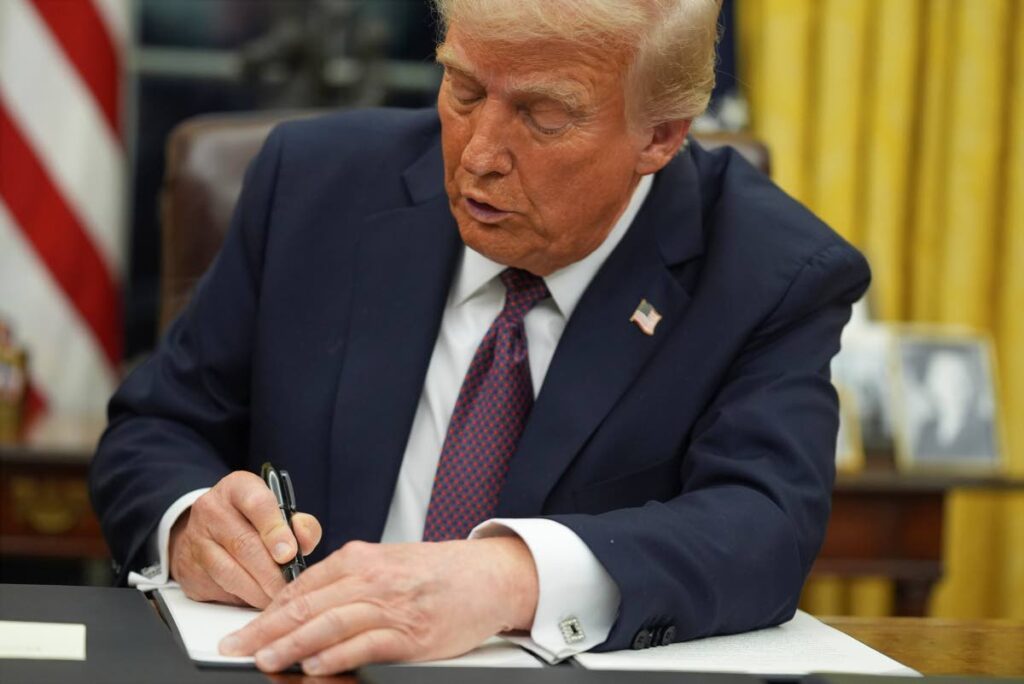Caribbean immigrants weigh in on Trump’s immigration orders

THERE were diverse opinions among Caribbean nationals in the US over President Trump’s immigration policies.
Some believe cracking down on illegal immigration helps improve the country by targeting criminals and reducing economic strain, expressing concern over migrants who don’t contribute to the economy.
They also support stricter vetting of immigrants and feel Trump is beneficial for the economy.
On the other hand, some feel Trump's policies are harmful to marginalised communities and rooted in white supremacy.
Hours after his January 20 swearing-in ceremony, marking the beginning of his second term as the 47th president of the US, Trump issued a series of executive orders. In his inaugural address, he proclaimed the start of a "Golden Age" for America and highlighted his priorities on trade, immigration, and national security.
Newsday spoke with a Trinidadian-born woman living in Miami, on the basis on anonymity. She began the process of obtaining a green card for herself and her two children in October.
While she is concerned about her application, she is hopeful the courts will intervene to streamline Trump's orders.
She is not entirely opposed to his decisions, saying there are many illegal immigrants in the country.
"I believe it isn’t a bad thing. He is targeting the criminals and people who aren’t doing anything to better the country," she explained.
She also agrees with Trump’s decision to end birthright citizenship: "If both your parents are illegal and not doing anything, why should their child be given citizenship?"
As for her family’s permanent residency process, they had to submit medical forms and biometrics. She is currently waiting for feedback on the next phase, a formal interview. She has been living in Miami for almost two years.
In Florida, a Trinidadian father of one who owns his own business and who also wished to remain anonymous expressed agreement with Trump's immigration and deportation plans. His son, born in the 2000s, is a US citizen; at the time, the man and the child's mother were both illegal immigrants.
"I came here, worked hard, and have my own business. I see so many migrants, not really Caribbean people but from other countries, coming here and just doing nothing, putting a strain on the economy."
He also believes sending children born to illegal immigrants back to their parents' home country with them is the best option, so they will not end up in the foster care system, which he said also needs revisiting to better protect children.
He warned Caribbean migrants to think carefully about deciding to migrate, saying, "It’s not a bed of roses." He believes Trump's plans to bring manufacturing back to the US will strengthen the economy and reduce unemployment.
In New York, a Trini-American man with whom Newsday previously spoke in November shared his critical view of Trump's presidency. In November, he described Trump's campaign as "dangerous and divisive."
He believes Trump’s terms will be harmful to marginalised communities, and his immigration orders and birthright ban don’t serve the best interests of the US.
Noting that many jobs done by migrant workers are traditionally looked down upon by US residents, he said, "Americans generally don’t like hard work, and some of the jobs migrant workers occupy are very laborious."
He also believes Trump’s immigration policies may be "based on white supremacy" and hopes that each state and the judicial system will fight Trump's proposals.
Also in New York, a 60-year-old grandmother of three, who gave her name only as Pat, expressed support for Trump’s crackdown on immigration, saying proper vetting needs to be done.
"It feels like they’re allowing anybody to enter the US."
She cited a December subway attack in which a Guatemalan man set a woman on fire in Brooklyn. The attacker allegedly watched as the victim burned to death, a crime that New York’s top cop called "one of the most depraved crimes one person could possibly commit."
Pat believes Trump is good for the economy, as "he is a very successful businessman."
However, she is not in favour of ending birthright citizenship for children born to illegal immigrant parents, as her grandchildren are first-generation Americans.
She also warned Caribbean nationals who plan to migrate illegally, advising, "Up here is very hard, so you have to work. You cannot sit down and do nothing, and the police don’t play. If you want to come, just know you have to do the right thing."
According to World Population Review, 233,908 TT citizens are living in the US as of 2024. New York stands out as the primary hub, with 85,651. Other top states include Maryland with 13,163, New Jersey with 17,351, Florida with 39,566, and Georgia with 10,001.
One of the key executive orders, titled Protecting the Meaning and Value of American Citizenship, stipulated that his administration would no longer recognise automatic citizenship for children born on US soil to immigrant parents who are in the country illegally, provided neither parent is a US citizen or legal permanent resident.
Trump had previously threatened similar action in his first term, but did not follow through. The order is set to take effect in 30 days and would also bar automatic citizenship for children born to non-citizen parents who are in the country on temporary work, student, or tourist visas.
In addition, Trump ordered 1,500 troops to the US/Mexico border to stop illegal immigration.
Since his executive order to end birthright citizenship was signed, it has faced numerous legal challenges. A coalition of 18 states, including New Jersey, New York, and California, filed lawsuits arguing the order violates constitutional rights and imposes undue costs on local jurisdictions.
The District of Columbia and the city of San Francisco have also joined these lawsuits.
The plan faces significant logistical hurdles, as the administration has not yet explained how it will enforce the order or who will be responsible for reviewing documents to assess eligibility for citizenship.

Comments
"Caribbean immigrants weigh in on Trump’s immigration orders"